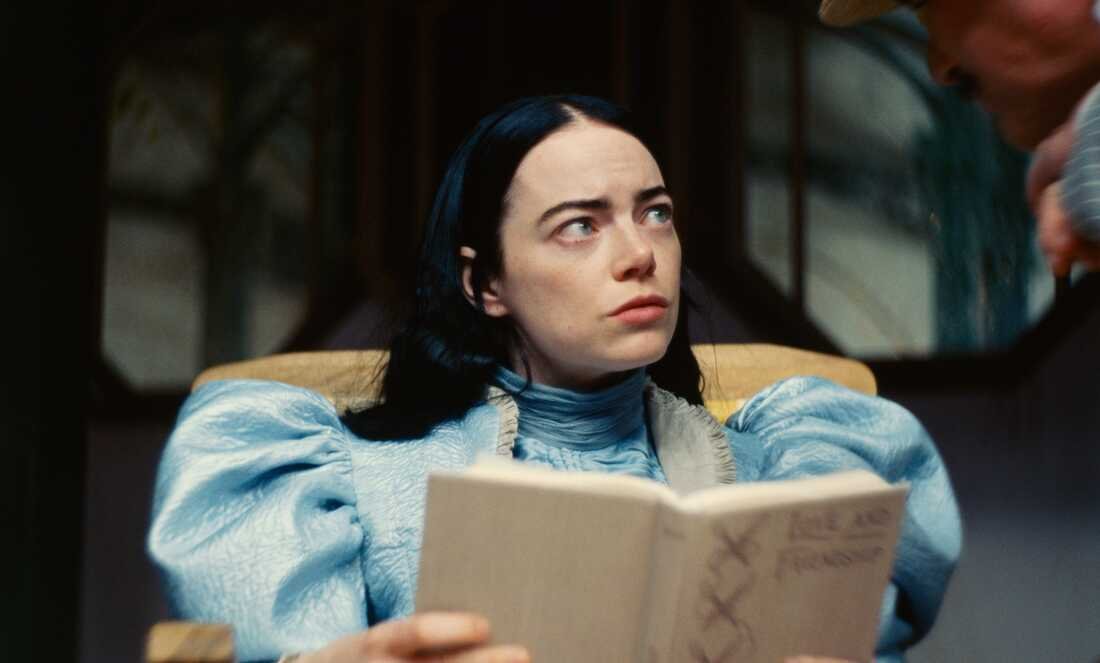POOR THINGS
Directing: A-
Acting: A-
Writing: B+
Cinematography: A-
Editing: B+
I’m having somewhat of a difficult time deciding what to make of Poor Things. It does seem excellent, but to what degree am I coming to that conclusion because so many others have already said so? Indeed, I can come up with very few criticisms. Does my take that much of it struck me as a cross between Edward Scissorhands and Mars Attacks! count as a criticism?
Poor Things is the kind of film that, perhaps, requires multiple viewings. But we’ve just recently been over this: who has the time for that? Well, I do love director Yorgos Lanthimos, and this may actually be one of the few films I do go out of my way to see again. This guy has a knack for taking a premise that might seem derivative on the surface, and transform it into an innovation. That just may be what he’s doing here.
Of course, just as Edward Scissorhands was before it, Poor Things is a riff on the Frankenstein story. Except, in this case, the doctor (Willem Dafoe) is the mutilated monster, and the “monster” is the radiant Bella (a genuinely remarkable Emma Stone). Bella is the revived corpse of a woman who threw herself off of a bridge, but with the brain of her unborn child transplanted into her head.
Lanthimos is entirely unconcerned with pracitcal matters like fitting a tiny infant’s brain into the head of a grown woman. This is entirely beside the point, in a highly stylized universe that mixes Victorian aesthetics with 21st century sensibilities, a color-saturated world that presents itself as fantasy but mirrors the realities of Western ethics and morals, however bent they might be.
I thought a lot about the potential timelessness of Poor Things as I watched it, with its stunning production design that places it in a sort of outer region of time. This is a film that will hold up after many years, even as it references ideas, and even films, that came long before it. There’s some of The Wizard of Oz at work here, quickly shifting from the brilliant color of a pregnant woman leaping from a bridge, to stark black-and-white scenes of Bella, an infant growing into the world from the vantage point of an adult human body. The black and white lasts a surprisingly long time, Bella clapping like a baby, stumbling around like someone who is just learning to walk, because she is.
It’s only when it flashes back to Dr. Godwin Baxter (Dafoe) performing the brain transplant does it briefly shift back to color, and only when Bella has grown a bit, learned enough words and absorbed enough ideas, and has decided to go on a grand adventure, does the shift to color become permanent. I’m slightly ambivalent about this as a concept, but it’s mesmerizing to look at.
Poor Things, it turns out, is very interested in sexuality. This is one of the things that makes the movie great, with the fascinating premise of an incredibly innocent mind making the discovery, before society has had a chance to instill any shame in her about it. This makes for a lot of confusion and comedy among those around Bella, such as when she masturbates at the dining table with a fruit. I hope they use that as Emma Stone’s clip at the Oscars.
Baxter has an assistant, Max (Ramy Youssef), hired to collact data about Bella’s progress, in the process of which he develops feelings for her. Baxter decides they should marry, as a purely practical decision, and brings in a lawyer to draw up the legal documents—Duncan (Mark Ruffalo). Duncan is immediately smitten with Bella, and, over time, alternately flummoxed by her self-interested and self-assured behaviors. Ultimately Duncan becomes a clear microcosm of male reactions to women, and particularly their sexuality and their autonomy. There were times I found this played out very insightfully, and at others it just seemed really on the nose. Either way, Ruffalo is wonderful, in a role that showcases his talents far more than any of the countless Marvel movies he’s been in have managed.
We glean that Baxter has performed many amputations, swapping heads of different species of animals, a chicken with the head of a pig, or a dog with the head of a duck (these were the things that reminded me of Mars Attacks!). I hesitate to call any part of Poor Things “over the top,” but it might be fair to call some elements “a little much.” This is definitely the case with a sort of gag at the very end, without which I think this film would be notably improved—and it’s already uniquely impressive.
During Bella’s adventures away with Duncan (during which she also meets a young, self-described cynic played by Jerrod Carmichael), Baxter finds another body to revive. This one is played by Margaret Qualley, but nearly all of her screentime depicts her in a state of arrested development. It seemed a waste of Qualley’s talent. On the other hand, clearly there are actors simply eager to work with Yorgos Lanthimos.
I’m having an unusually odd reaction to Poor Things, a somewhat middling response to a piece of excellence with slightly wobbly foundations. This film spoke to me, but not in the visceral way I have responded to Lanthimos’s previous work, be it The Lobster (delightfully twisted) or The Killing of a Sacred Deer (deeply disturbed) or The Favourite (a provocative and funny period piece that has the unusual distinction of consistently improving with repeat viewings). If there’s one thing I can count on Yorgos Lanthimos for, though, is for him to keep pulling me back again. Either I will distance myself from this film as time goes on, or time will strengthen my affection for it—and this is a filmmaker with a talent for achieving the latter.
We find ourselves analyzing what Bella is learning.
Overall: A-

